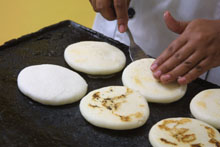By Sue Lavene
Perhaps we cannot just leave our desks and take a trip to Morocco spur of the moment. However, right in our city of Philadelphia, with fabulous multi-ethnic restaurants the norm, the staff at AmeriSpan enjoyed an evening "away" at a Moroccan restaurant, sharing a traditonal Moroccan feast in celebration of the 2005 holidays.
Exotically decorated in authentic décor, this casual and cozy restaurant was furnished with low sofas, large comfy pillows, dim lighting and the best part – no utensils! It's the perfect excuse to eat family style with your hands (hopefully scrubbed clean beforehand!), well, except for the soup.
A waiter carrying a large metal pitcher greeted us and passed out white hand towels to everyone. We were all instructed to gather our hands together over a pail, rubbing them together as he poured out the water, an impressive and fun (though not effective) display of ritual hand washing. We dried our hands with the towels provided that doubled as our napkins.
For the first course out of seven, Harira – a Moroccan soup traditionally eaten to break the fast during Ramadan – we used long wooden sticks with one end pointy, the other a small triangular shaped spoon.
The second course one of my favorites, a plate of 3 types of salads, one a creamy garlicky eggplant dip, another similar to the Mexican pico de gallo with tomatoes and onions and lastly, chopped carrots. Served with pita wedges, it was fun to watch my colleagues to see who dug in without hesitation – regardless of the fact that when the pita was gone, we had to use our fingers – and who was more reserved and stopped after they had no more bread.
Our eager palates were then introduced to the savory and sweet part of the meal, Bastilla, a traditional pigeon pie made from crushed almonds, eggs, warka or a phyllo-type dough and lots of powdered sugar on top. Of course, they wouldn't dare use Philadelphian pigeons because they wouldn't work well (so I hoped!) but used chicken instead. A vegetarian version was also served for me though I enjoyed the chicken better.
The next two courses were the tender and tasty whole roasted chicken with harisa cumin sauce and olives that we ripped apart with our hands and a huge plate of vegetable couscous.
As if we hadn't yet had enough food, for dessert, we were served a bowl of whole fruit, yummy pastries that tasted like baklava and hot mint tea to top off the dinner.
Of course, my blog would be incomplete if I didn't mention the hookahs for two being smoked by couples around us throughout the night.
Honestly, I had not had Moroccan food before this meal so I cannot vouch for its authenticity; however, it was delicious and I would definitely encourage people to experience it – for the ambiance and the food – at least once!





 ShareThis
ShareThis
